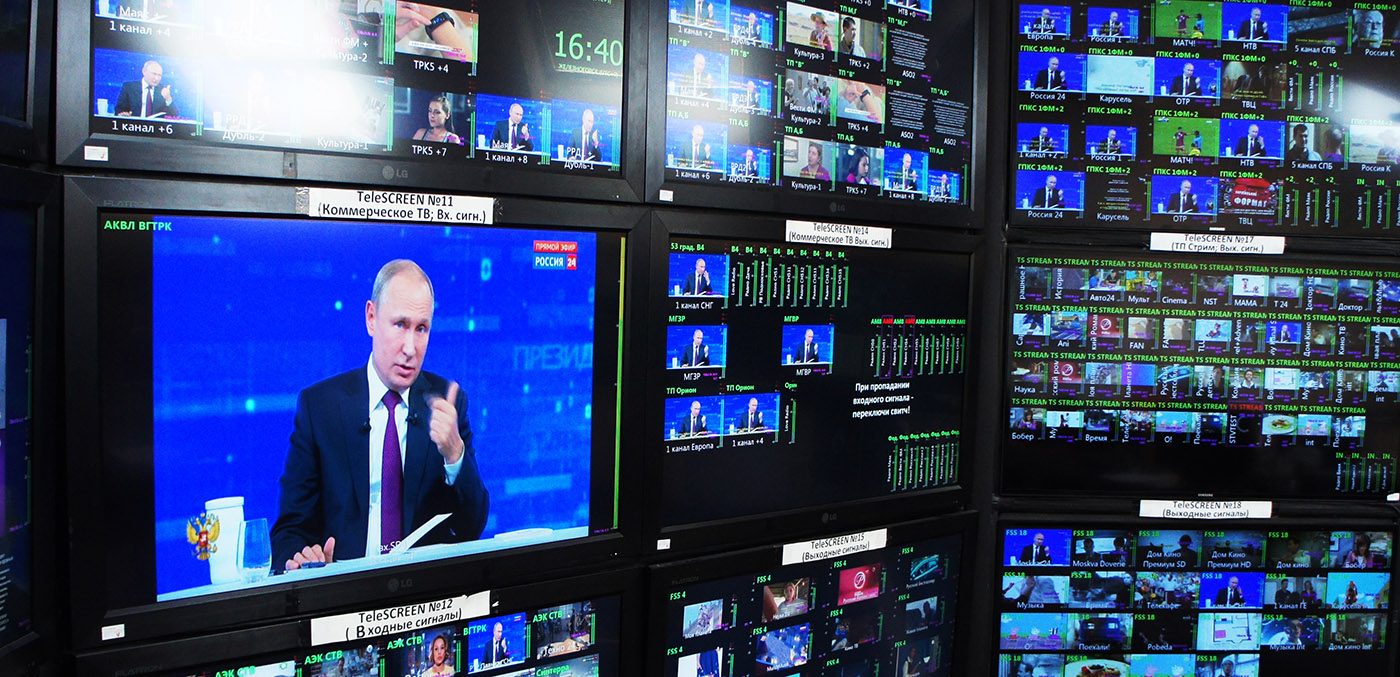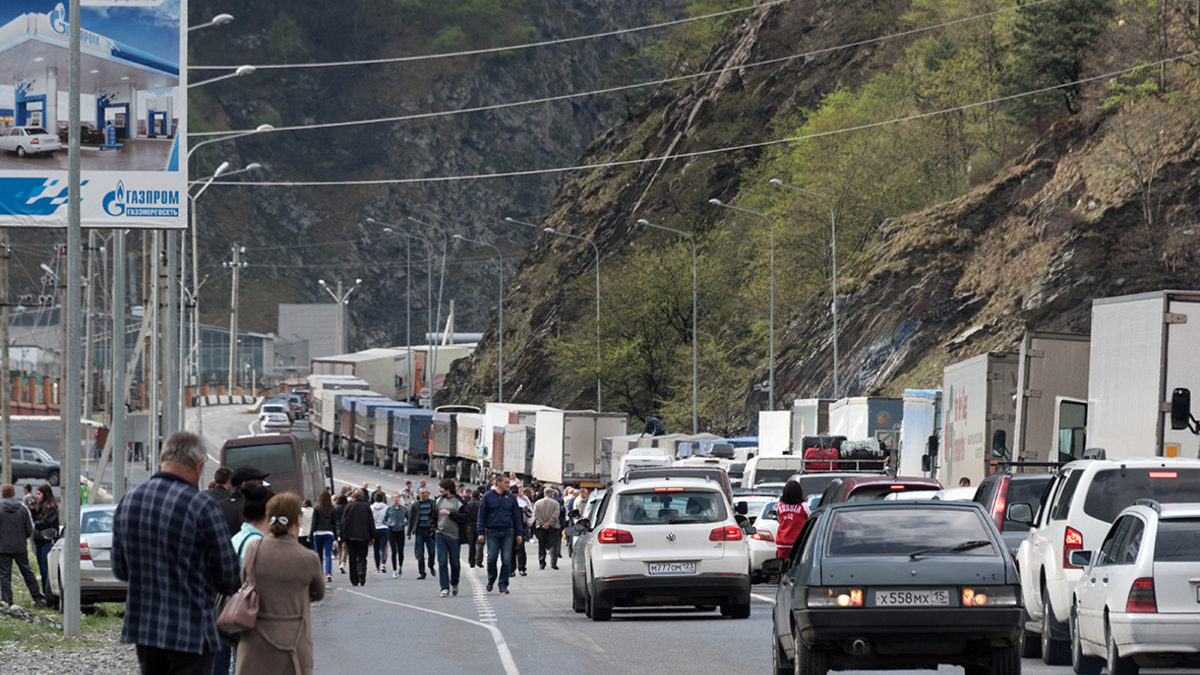Propaganda Issues
Critics of Russian propaganda often reproduce its core mistake — taking their own perceptions of reality for reality itself
By Fedor Krasheninnikov April 16, 2022

Critics of Russian propaganda often reproduce its core mistake — taking their own perceptions of reality for reality itself
By Fedor Krasheninnikov April 16, 2022

It has become common to criticize Russia’s leadership for falling for their own propaganda and expecting that their planned invasion of Ukraine would receive support from the local population and demoralize Russia’s elites. Most likely, what has happened is the following: Vladimir Putin had clearly overestimated Ukrainian citizens' negative sentiment toward their own Ukrainian government and Ukrainian citizens' positive attitude toward Putin and Russia in general.
However, multiple reiterations of such statements across the Ukrainian, international, and Russian opposition media do not prevent those who resist Russian propaganda from repeating the same mistake.
It has become common to criticize Russia’s leadership for falling for their own propaganda and expecting that their planned invasion of Ukraine would receive support from the local population and demoralize Russia’s elites. Most likely, what has happened is the following: Vladimir Putin had clearly overestimated Ukrainian citizens' negative sentiment toward their own Ukrainian government and Ukrainian citizens' positive attitude toward Putin and Russia in general.
However, multiple reiterations of such statements across the Ukrainian, international, and Russian opposition media do not prevent those who resist Russian propaganda from repeating the same mistake.
Most importantly, we need to understand who should be the target audience for counterpropaganda.
First, the target audience should be those who have access to counterpropaganda sources and are willing to use them.
Second, it should be those who are critical thinkers and belong to the educated part of society. People living below the poverty line, outcasts, and Putin’s ideological followers are not ready to accept anything from alternative sources of information.
Targeting Putin’s nuclear electorate by leveraging social media, which is banned in Russia, and YouTube is doomed to failure. Ultimately, it comes down to the fact that people, who are already against Putin and not necessarily against soldiers, have to listen to the endless messages addressed to the soldiers and Putin’s supporters.
The situation might get even worse in case of the effective ban of YouTube and VPN services in Russia. An exceptionally motivated part of society will continue to consume information from alternative sources. In contrast, the rest of society will have no opportunity to accidentally stumble upon a point of view that differs from the official one.
In this case, it is particularly important to understand counterpropaganda priorities. Unfortunately, the authors of counterpropaganda messages often stew in their own juices and try to convey what has long seemed obvious to them. However, a potential listener or reader of such messages in Russia might not find such messages obvious at all.
First, very few people are ready to admit that they fell victim to propaganda. Russian propaganda is smarter and trickier than one might think. It is based not so much on demand to recognize whatever the Kremlin says is true but on the tempting offer to believe nothing and doubt everything.
In light of this approach, the victim of propaganda is someone who, overly confident in their rightness and consumed by pretentious monologues, exposes “Kremlin propaganda.“ “Our people are lying, and yours are lying too, why should I believe anyone’s lies?” — this is the logic on which Russia’s propaganda for the “smart” ones is built, and it actually works. More pressure on such individuals to change their minds regarding Ukraine and the West results in them more actively forming their opinion that they are being brainwashed and forced to become uncritical thinkers.
Second, both the authors of counterpropaganda messages who left Russia and those who have never been there (particularly the latter) tend to depict life in the country in much darker colors than Russians themselves perceive it. What is the point of poking Moscow, St. Petersburg, or any other prominent city resident’s nose in pictures of villages with bathrooms outside the houses or ruins on the outskirts of distant cities?
They live in a completely different environment. A firmly held belief of a foreign critic of Putin that the entire Russia lives in poverty, starvation, and without comfortable bathrooms only casts doubt on the rest of this critic’s messages: if you are lying that we live so badly here, then why should we believe the rest of your words?
Most importantly, we need to understand who should be the target audience for counterpropaganda.
First, the target audience should be those who have access to counterpropaganda sources and are willing to use them.
Second, it should be those who are critical thinkers and belong to the educated part of society. People living below the poverty line, outcasts, and Putin’s ideological followers are not ready to accept anything from alternative sources of information.
Targeting Putin’s nuclear electorate by leveraging social media, which is banned in Russia, and YouTube is doomed to failure. Ultimately, it comes down to the fact that people, who are already against Putin and not necessarily against soldiers, have to listen to the endless messages addressed to the soldiers and Putin’s supporters.
The situation might get even worse in case of the effective ban of YouTube and VPN services in Russia. An exceptionally motivated part of society will continue to consume information from alternative sources. In contrast, the rest of society will have no opportunity to accidentally stumble upon a point of view that differs from the official one.
In this case, it is particularly important to understand counterpropaganda priorities. Unfortunately, the authors of counterpropaganda messages often stew in their own juices and try to convey what has long seemed obvious to them. However, a potential listener or reader of such messages in Russia might not find such messages obvious at all.
First, very few people are ready to admit that they fell victim to propaganda. Russian propaganda is smarter and trickier than one might think. It is based not so much on demand to recognize whatever the Kremlin says is true but on the tempting offer to believe nothing and doubt everything.
In light of this approach, the victim of propaganda is someone who, overly confident in their rightness and consumed by pretentious monologues, exposes “Kremlin propaganda.” “Our people are lying, and yours are lying too, why should I believe anyone’s lies?” — this is the logic on which Russia’s propaganda for the “smart” ones is built, and it actually works. More pressure on such individuals to change their minds regarding Ukraine and the West results in them more actively forming their opinion that they are being brainwashed and forced to become uncritical thinkers.
Second, both the authors of counterpropaganda messages who left Russia and those who have never been there (particularly the latter) tend to depict life in the country in much darker colors than Russians themselves perceive it. What is the point of poking Moscow, St. Petersburg, or any other prominent city resident’s nose in pictures of villages with bathrooms outside the houses or ruins on the outskirts of distant cities?
They live in a completely different environment. A firmly held belief of a foreign critic of Putin that the entire Russia lives in poverty, starvation, and without comfortable bathrooms only casts doubt on the rest of this critic’s messages: if you are lying that we live so badly here, then why should we believe the rest of your words?


The economic situation in Russia is indeed deteriorating. Still, it is happening slowly and not as apparent to Russia’s citizens as many critics of the Putin regime would like it to be. There is an increase in prices, but prices are rising everywhere in the world. Russians are aware of that. It is too early to talk about empty store shelves in Russia. However, those outside Russia have already convinced themselves that the store shelves are indeed empty.
There are problems associated with getting some medications and other goods, but this is a serious problem only for those who need specific medications and goods. Everyone else may have not even noticed the extent of the problem. On this basis, they might believe that it is not Putin’s propagandists, insisting that everything is not so bad, who are lying to them. It is the critics of Putin’s propagandists who broadcast empty shelves and the coming famine.
Third, the course of the war in Ukraine allows Kremlin propaganda to talk about an inevitable victory and insist that the campaign is dragging on solely because Russia is striving for peace with all its might. If it was not for the notorious “Nazis” and the West, everything would have ended a long time ago.
Also, Russians have been told that Russia has already lost since the first day of the war. This only undermines Russia’s belief in all other messages. It is enough for one to take a look at the map to make sure that the military actions are taking place on the territory of Ukraine, and everything looks like a defeat for Ukraine, not Russia.
Especially, this applies to those consumers of information who live in Russia and think, by default, that Russians and their allied forces of the notorious DPR/LRP are “their own.“ Accordingly, any messages based on the notion that Russia has already lost the war are perceived as fake by the Russian audience.
Fourth, Russian propaganda has been preparing to deal with the reports about the victims of aggression for many years. One of the most essential components of Putin’s propaganda relies on conspiracy theories and their notion that conspiracy theories can explain any phenomenon in the world.
An individual living in such paradigm is ready to believe that the almighty and insidious West can produce high‑quality fakes to deceive the Russians. They might also believe that the Ukrainian authorities (Nazis and puppets of the West) are so cynical and insidious that they are pretty capable of killing their own citizens to create the desired image.
And here comes the statement, as mentioned earlier, that everyone around is lying. A Russian also fully admits that the Russian authorities are capable of arranging something like that with their citizens and that, in general, all methods are acceptable during the war. So why can’t they suspect that the Ukrainian authorities can do the same? Propaganda hints at this, constantly winking at their listeners and readers: well, yes, we both lie and kill, but they are no better either — but this is us, and that’s them, they are strangers.
Therefore, photo and video evidence that seems super‑convincing to Western audiences can convince only those in Russia who were initially ready to accept a different point of view.
What is our conclusion, and what can we do with all this?
First, do not believe in your own propaganda and think that the living conditions in Russia are unbearable. When describing what is happening in Russia, it is important not to contradict with what people see with their own eyes. Otherwise, it undermines faith in everything else. It is necessary to speak about the impending deterioration of the situation reasonably and regularly remind people that pessimistic forecasts tend to come true. But the positive expectations of their authorities do not.
Second, there is no point in addressing an audience that does not use social networks and media. Neither the soldiers of the Russian army, nor their parents, nor Putin’s nuclear electorate is likely to watch opposition, Ukrainian and foreign news, and journalistic channels on YouTube — even though these channels are being constantly called out. Those who doubt even a little are watching.
The economic situation in Russia is indeed deteriorating. Still, it is happening slowly and not as apparent to Russia’s citizens as many critics of the Putin regime would like it to be. There is an increase in prices, but prices are rising everywhere in the world. Russians are aware of that. It is too early to talk about empty store shelves in Russia. However, those outside Russia have already convinced themselves that the store shelves are indeed empty.
There are problems associated with getting some medications and other goods, but this is a serious problem only for those who need specific medications and goods. Everyone else may have not even noticed the extent of the problem. On this basis, they might believe that it is not Putin’s propagandists, insisting that everything is not so bad, who are lying to them. It is the critics of Putin’s propagandists who broadcast empty shelves and the coming famine.
Third, the course of the war in Ukraine allows Kremlin propaganda to talk about an inevitable victory and insist that the campaign is dragging on solely because Russia is striving for peace with all its might. If it was not for the notorious “Nazis” and the West, everything would have ended a long time ago.
Also, Russians have been told that Russia has already lost since the first day of the war. This only undermines Russia’s belief in all other messages. It is enough for one to take a look at the map to make sure that the military actions are taking place on the territory of Ukraine, and everything looks like a defeat for Ukraine, not Russia.
Especially, this applies to those consumers of information who live in Russia and think, by default, that Russians and their allied forces of the notorious DPR/LRP are “their own.” Accordingly, any messages based on the notion that Russia has already lost the war are perceived as fake by the Russian audience.
Fourth, Russian propaganda has been preparing to deal with the reports about the victims of aggression for many years. One of the most essential components of Putin’s propaganda relies on conspiracy theories and their notion that conspiracy theories can explain any phenomenon in the world.
An individual living in such paradigm is ready to believe that the almighty and insidious West can produce high‑quality fakes to deceive the Russians. They might also believe that the Ukrainian authorities (Nazis and puppets of the West) are so cynical and insidious that they are pretty capable of killing their own citizens to create the desired image.
And here comes the statement, as mentioned earlier, that everyone around is lying. A Russian also fully admits that the Russian authorities are capable of arranging something like that with their citizens and that, in general, all methods are acceptable during the war. So why can’t they suspect that the Ukrainian authorities can do the same? Propaganda hints at this, constantly winking at their listeners and readers: well, yes, we both lie and kill, but they are no better either — but this is us, and that’s them, they are strangers.
Therefore, photo and video evidence that seems super‑convincing to Western audiences can convince only those in Russia who were initially ready to accept a different point of view.
What is our conclusion, and what can we do with all this?
First, do not believe in your own propaganda and think that the living conditions in Russia are unbearable. When describing what is happening in Russia, it is important not to contradict with what people see with their own eyes. Otherwise, it undermines faith in everything else. It is necessary to speak about the impending deterioration of the situation reasonably and regularly remind people that pessimistic forecasts tend to come true. But the positive expectations of their authorities do not.
Second, there is no point in addressing an audience that does not use social networks and media. Neither the soldiers of the Russian army, nor their parents, nor Putin’s nuclear electorate is likely to watch opposition, Ukrainian and foreign news, and journalistic channels on YouTube — even though these channels are being constantly called out. Those who doubt even a little are watching.


Thus, we should build trust with these people and start a conversation with them at their level. We should not call them to immediate street protests and an overthrow of Putin using arguments involving their (Russia’s citizens) genetic inferiority, cowardice, and the inferiority of everything associated with Russia.
Third, reporting on the course of hostilities should not be one‑sided and reduced to a retelling of the Ukrainian version of events. It should be objective or at least strive for objectivity.
Unfortunately, at the current moment, people who are in different information bubbles seem to observe two different wars that do not overlap. It is understandable that Ukraine, being involved in this war, is interested in spreading the version of events that is beneficial to them. But this position of Ukraine is obviously unacceptable to those who observe the situation through the lens of Russian propaganda.
Here, the situation described above repeats again: the listener or reader concludes that of the two propagandas, they must choose the one they like best. The Russian viewer would choose the Russian version of events because it is morally difficult to view one’s own country as an aggressor, their army as criminal, and their soldiers as marauders. And this will continue until something that would destroy their faith in the truthfulness of Russian propaganda happens — for example, an evident and unconditional military defeat.
Fourth, we should systematically and consistently deal with the conspiracy foundation of Putin’s propaganda, both by turning conspiracy theories against Putin and his regime and proving their untruthfulness. Naturally, such work would require a careful and talented approach. Unsubstantiated accusations of unsubstantiation do not work and will not work.
Thus, we should build trust with these people and start a conversation with them at their level. We should not call them to immediate street protests and an overthrow of Putin using arguments involving their (Russia’s citizens) genetic inferiority, cowardice, and the inferiority of everything associated with Russia.
Third, reporting on the course of hostilities should not be one‑sided and reduced to a retelling of the Ukrainian version of events. It should be objective or at least strive for objectivity.
Unfortunately, at the current moment, people who are in different information bubbles seem to observe two different wars that do not overlap. It is understandable that Ukraine, being involved in this war, is interested in spreading the version of events that is beneficial to them. But this position of Ukraine is obviously unacceptable to those who observe the situation through the lens of Russian propaganda.
Here, the situation described above repeats again: the listener or reader concludes that of the two propagandas, they must choose the one they like best. The Russian viewer would choose the Russian version of events because it is morally difficult to view one’s own country as an aggressor, their army as criminal, and their soldiers as marauders. And this will continue until something that would destroy their faith in the truthfulness of Russian propaganda happens — for example, an evident and unconditional military defeat.
Fourth, we should systematically and consistently deal with the conspiracy foundation of Putin’s propaganda, both by turning conspiracy theories against Putin and his regime and proving their untruthfulness. Naturally, such work would require a careful and talented approach. Unsubstantiated accusations of unsubstantiation do not work and will not work.
Why the World Must Support Russians Fleeing Mobilization
By Fedor Krasheninnikov
October 03, 2022
 Article
Article By Yury Krylov
December 24, 2022
 Article
Article The first days of the war marked not only the start of a tragedy but also the point after which Russia lost thousands of its most active citizens
By Fedor Krasheninnikov
March 07, 2022

Why the World Must Support Russians Fleeing Mobilization
By Fedor Krasheninnikov
October 03, 2022
 Article
Article By Yury Krylov
December 24, 2022
 Article
Article The first days of the war marked not only the start of a tragedy but also the point after which Russia lost thousands of its most active citizens
By Fedor Krasheninnikov
March 07, 2022
